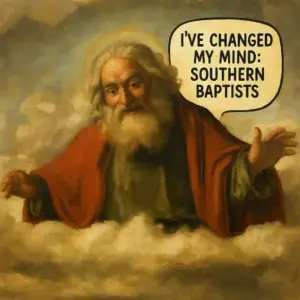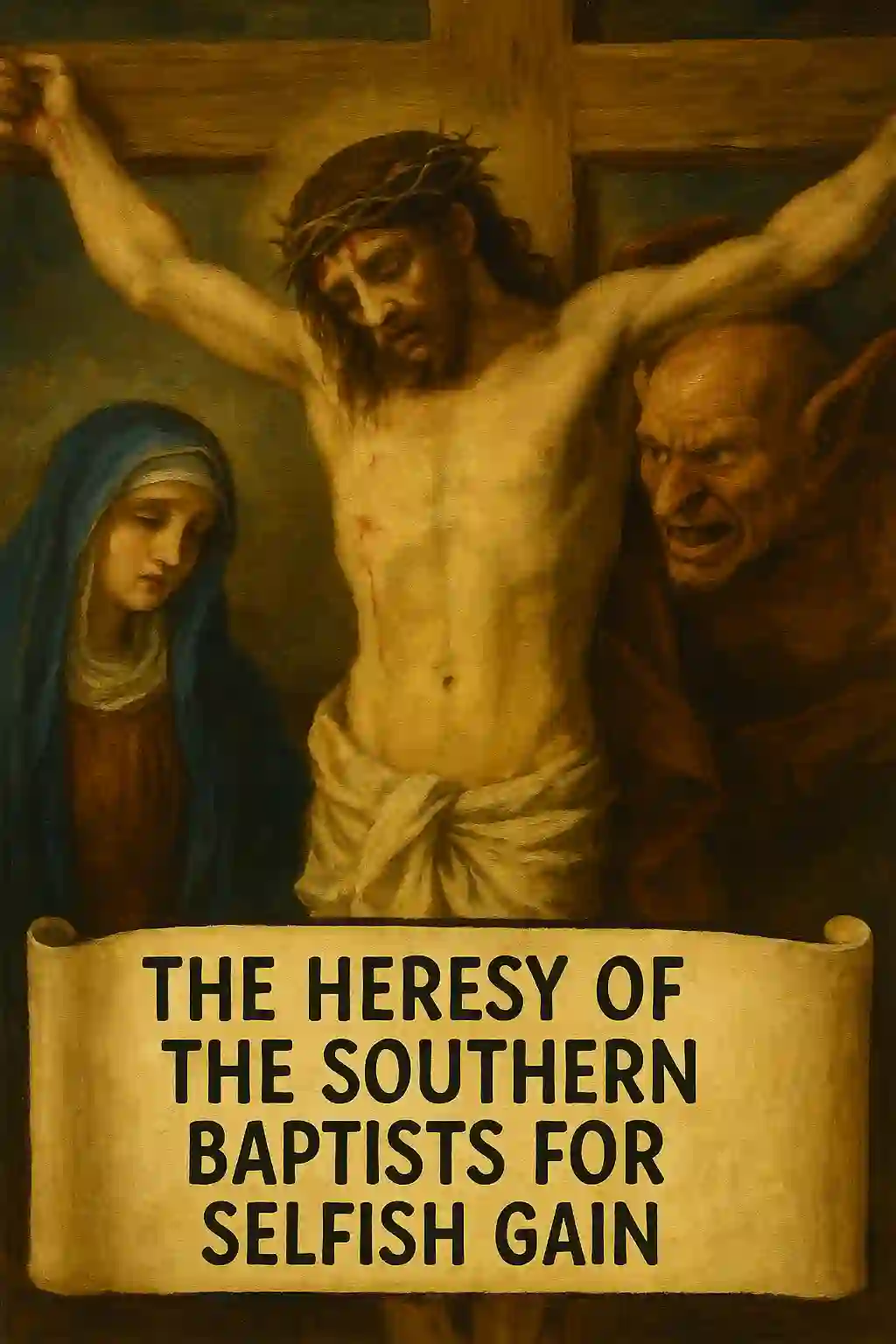From Permissible to Prohibited
Change of heart: The Southern Baptist Convention’s Abortion Reversal (1970-1980)
Abstract: This essay explores the dramatic reversal in the Southern Baptist Convention’s (SBC) stance on abortion between 1970 and 1980. Initially adopting a moderate and situationally permissive position, the SBC would by the early 1980s declare abortion tantamount to murder. This paper investigates the theological, cultural, and political forces behind the shift, emphasizing the rise of fundamentalism, the influence of the Religious Right, and the strategic use of doctrinal rigidity. It also critically addresses the misuse of Scripture to claim that abortion is murder—highlighting that such assertions not only lack sound biblical support but border on theological blasphemy. This transformation not only affected denominational identity but also helped define modern evangelical politics in the United States.
Introduction

Few theological pivots in modern American religious history are as striking as the Southern Baptist Convention’s about-face on abortion policy. In the early 1970s, the SBC endorsed nuanced and moderate views on abortion. By 1980, the convention had wholly reversed its stance, declaring abortion to be the moral equivalent of murder. To outside observers, it might seem as though “God had a change of heart.” In truth, the transformation was less divine revelation than sociopolitical recalibration. This essay explores the timeline, ideological factors, and broader consequences of this transition, reflecting on how a theological institution navigated one of the most divisive moral issues of its time.
1. The Moderate Phase: SBC Resolutions of 1971 and 1974
In 1971, just two years before Roe v. Wade, the SBC passed a resolution affirming that abortion might be justifiable in cases of rape, incest, fetal deformity, or threats to the mother’s emotional or physical health. A similar resolution was reaffirmed in 1974. These early stances were neither explicitly pro-choice nor doctrinally radical. Instead, they reflected the denomination’s desire to navigate the gray areas of moral decision-making with pastoral care and ethical flexibility (Early Jr., 2020).
M. Dillon (1995) notes that these resolutions adopted “tentative moral openness,” in stark contrast to the Catholic Church’s natural law absolutism (Dillon, 1995). Even public surveys within the denomination, such as the Baptist VIEWpoll in 1970, revealed that a substantial proportion of Southern Baptists believed abortion should be permitted under specific circumstances (Foxworth, 2014).
This period was marked by a broader climate of theological diversity within the SBC. The convention’s vast membership allowed for differing views on social issues, with many leaders embracing the ethic of Christian compassion over rigid doctrine.
2. The Theological Turn: Rise of Fundamentalism and Biblical Literalism
By the late 1970s, however, the SBC began undergoing what is now known as the “conservative resurgence” or the “fundamentalist takeover.” A new generation of leaders began pushing for a return to strict biblical literalism and doctrinal uniformity. Abortion, once treated as a complex ethical issue, became framed as a clear-cut case of murder.
This theological hardening was not solely a matter of doctrine but was deeply interwoven with politics. The 1980 resolution unequivocally condemned abortion, stating that it “constitutes the taking of an innocent human life.” The language reflected an embrace of a fetus’s full personhood from conception—a theological position not historically central to Baptist tradition (Sadler, 1991).
Yet, nowhere in Scripture is abortion explicitly described as murder. The assertion that abortion is equivalent to homicide is a doctrinal leap not supported by the Bible and often distorts the original texts for political gain. Misusing Scripture to declare abortion as murder is not only exegetically unsound—it flirts with theological blasphemy. Such abuse of sacred texts undermines the gravity of divine revelation and weaponizes faith for ideological purposes.
The shift also reflected growing discomfort with feminism, women’s ordination, and liberal theology. As Smith (2019) argues, abortion came to symbolize the broader threat of modern secularism and female autonomy, making it a convenient battlefield for asserting divine authority and patriarchal control.
3. Political Mobilization: The Religious Right and Strategic Theology
The SBC’s reversal cannot be understood apart from its alignment with the emerging Religious Right. Figures like Jerry Falwell and institutions like the Moral Majority helped evangelicals reframe moral issues into political agendas. Abortion became a unifying cause, bringing together conservative Protestants and Catholics in unprecedented coalitions.
Southern Baptist leaders became increasingly involved in national politics, and anti-abortion rhetoric served as a litmus test for doctrinal purity. Biggs (2017) notes that this period saw a fusion of theological absolutism with conservative American nationalism. By 1984, SBC leaders were explicitly instructing members to vote for anti-abortion candidates, further eroding the denomination’s historical stance on separation of church and state.
4. Consequences and Ironies: When God Seems to Shift
Your phrase that “God had a change of heart” captures the bitter irony of the SBC’s transformation. How could a denomination move from conditional acceptance to moral absolutism in just a decade? Was it divine revelation or political necessity?
The question reveals deeper tensions within evangelical theology. As Briscoe (2015) notes, the theological justification for the new position was retrofitted to match political priorities. In doing so, the SBC not only redefined abortion but reshaped its own identity. The church that once supported conscience and context became a battleground for ideological control.
Conclusion
Between 1970 and 1980, the Southern Baptist Convention transitioned from a denomination open to moral complexity to one committed to a singular, hardline view on abortion. This shift was not merely doctrinal but profoundly political. The embrace of biblical literalism, the rise of fundamentalist leadership, and the strategic alliance with conservative politics culminated in a theological rigidity that persists today. While Scripture calls for wisdom, compassion, and justice, weaponizing it to falsely equate abortion with murder distorts its purpose. The misuse of God’s word to serve ideological ends is not faithfulness—it is blasphemy.
References
- Dillon, M. (1995). Religion and culture in tension: The abortion discourses of the US Catholic Bishops and the Southern Baptist Convention. Cambridge Journal.
- Early Jr., J. (2020). From Permissible to Intolerable: Southern Baptists and the Abortion Debate in the 1970s. Gale Academic OneFile.
- Foxworth, L.J. (2014). The Spiritual is Political. University of South Carolina.
- Sadler, P.L. (1991). The abortion issue within the Southern Baptist Convention, 1969-1988. ProQuest Dissertation.
- Smith, S. (2019). The Sacralization of Absolute Power. Bowdoin College.
- Biggs, A.R. (2017). The Southern Baptist Convention “Crisis” in Context. Western Kentucky University.
- Briscoe, L.A. (2015). Sex, the Sacred, and the State. University of Georgia.
More Resources
Discover more from Master Yahshua Messiah
Subscribe to get the latest posts sent to your email.

